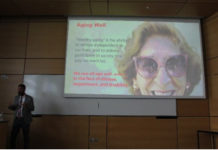Yesterday, the UW library’s special collections and archives department hosted an online event about the role of zines within Pride movements. Zines, short for “magazine,” are small publications that are often self-published and circulated throughout communities.
The special collections and archives team, which included department head Rebecka Sheffield, Jessie Blackwell, and Catherine Cassel, taught attendees about the history of zines within queer culture before moving into a workshop about how to begin creating them. Their presentation traced the history of such publications back to the 1950s, when queer folks across North America worked to build community after the second world war. The history of zines even has a direct connection to Waterloo, as The Body Politic, one of Canada’s earliest gay liberation magazines, was first published in Waterloo in the 1970s.
Blackwell also spoke about the role of the special collections department in documenting zines and other 2SLGBTQIA+ archival materials. As of right now, the department is home to 550 archival collections. While the department had initially been focused on collecting materials within “traditional” women’s studies (including topics such as health care and suffragette movements), it has since expanded to focus on more queer and trans materials. This includes the department’s lesbian literature collection which is composed of many lesbian pulp novels from the twentieth century, some of which were banned in Canada upon original publication.
The department has also begun to collect both historical and contemporary zines. One of their most recent acquisitions is several issues of Aché, a publication created in the 1980s by and for Black lesbians.
The team concluded the event by showing participants how they might begin to create their own zines through programs like Canva. Their hope is to collect the works created by participants, print them out, and feature them somehow within the special collections department.
They also encouraged members of the UW community to visit the department’s collections by booking an appointment. “The digital dark age is real,” Sheffield said, noting that it’s becoming rarer and rarer for people to interact physically with publications. She added, though, that she thinks within queer communities “there is an emergence, a return to materiality,” and that she hopes people will work to keep DIY publications like zines alive in the digital era.






























